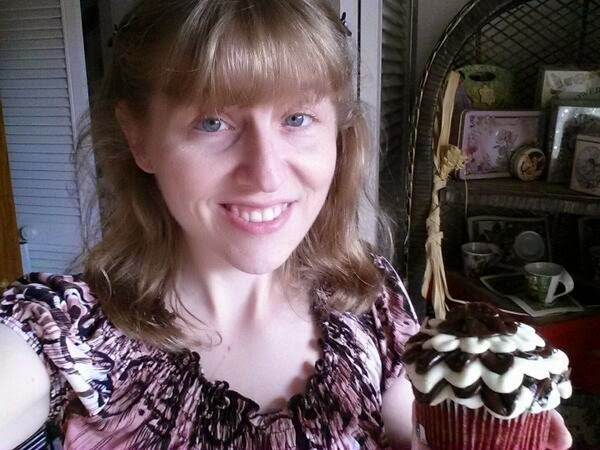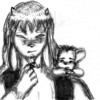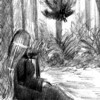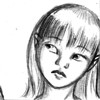Yesterday, I signed my first contract to publish short fiction in a magazine.
I bought myself a cupcake to celebrate that milestone. I think I'll make a tradition of it.
 |
| More icing than cupcake, really. |
I'm sure I'll talk more about that story and where you can read it when the issue I'm in is published. But today, I want to talk about compromise.
We're starry-eyed people for the most part, we writers. We have big dreams and overflowing pots of idealism, especially at the beginning of our careers. And there's nothing wrong with that. But now I want to say that for all three pieces of writing I've sold (for actual money) and for both of the agents I signed with, there was a compromise of some kind. Sometimes, it was a major one.
- This short story, a fairy tale retelling, actually invoked the fairy tale it was retelling by name and became very, as the editor called it, "meta." She loved the story but believed the association with its fairy tale should be more subtle, and asked if I would rewrite it with that in mind. My rewrite was accepted.
- The short nonfiction piece I recently sold about asexual femininity was accepted by the editor at the proposal stage and she loved my original version, but literally came back to me with a request to make it twice as long.
- The asexuality book got very few content-related revision requests, but there was definitely a fair amount of back and forth at the contract negotiation stage, and ultimately I sold my book to an imprint that specializes in library sales, not trade audiences. (There's always a possibility it will sell well enough to justify releasing it/marketing it to trade in the future, but as such, it's not part of the plan.) I would have liked to have wider reach from the beginning, but this is where everything led.
- The agent who signed my nonfiction offered me representation with the understanding that she did not think large publishers would want it, and she wanted me to understand that she would start in the middle with realistic expectations of selling to a medium or small house.
- The agent who signed my fiction loved my query and sample pages, but thought my word count was far too high. She asked me to take my 146,000-word book down to between 85,000 and 115,000 words before she would look at the rest of it. She signed me, but I had to cut over 30,000 words.
I have also made a few significant changes based on the opinions of beta readers, publishers who rejected me, and pieces I've read by other authors. So what does that make me? Would you like to say "Julie, why do you change your vision for other people? Are you a
sellout?"
Well, kind of. Not exactly. But it does have to do with the word "sell."
Let's make one thing clear: if you are aiming for publication--in the sense that someone other than you is publishing your work and offering you money for it, intending to then sell your work to consumers--then you are agreeing that you will be using another entity's resources, time, expertise, and cash to forward your message. You are also agreeing that you want that entity to have input into the product that gets released--and as publishing-industry professionals, people who offer you money for your work have the right to say "I am looking to pay for THIS product, and your product is not quite THIS product. I will pay you for it if you modify it to fit my needs."
They often know more than you do about what, ultimately, will sell in the marketplace.
They are not always right. But yes, if you think they are wrong, then in today's world you have the option of publishing your work yourself. You don't need to submit your poetry or short stories to established magazines and journals if you're content to post it on your blog. You don't need to find agency representation and/or get a publisher if you believe your book, as is, represents the best presentation possible of your work, and that you alone with the resources available to self-published authors can get your book out there. And yes, sometimes that works out really well for people--most of whom are
both talented and lucky.
But when you offer your work to publishing-industry professionals, they will tell you how to make it appropriate for
their audience's consumption, and if you don't agree with them, you can walk away. If what they ask you to do does not compromise the soul of the work--the reason why you wrote it in the first place--it would behoove you to try.
- For the short story: I like meta, so I was sad I had to rewrite it. But I got the idea for this short story because of the magazine's theme issue prompt, and I wrote the original in forty-five minutes. I saw no reason why I couldn't write an alternate version of it for this editor's magazine if I had written the original for her magazine in the first place. Now people get to meet my characters and enjoy the weird little modernization I came up with. And I have a short story credit for my résumé.
- For the nonfiction piece: I didn't think I had anything else to say on asexual femininity, and historically I'm never asked to say more since I'm usually too wordy, so I didn't know what to do initially to double my word count. But having more space to have my say encouraged me to make the piece more personal, with a varied tone and more valuable content, and I think it's a better read now.
- For the sale of the nonfiction book: I had three offers for this book. The library imprint was the best one I got. My choices were to either wait for a different opportunity or take this one, and honestly I think the time for this book is now. Despite not being able to concentrate on trade audiences for its distribution, it will be available at least, and perhaps the decision-makers are right that it's the type of book more people would want to borrow from a library than buy for themselves. If the demand is higher than expected, it may go to trade anyway, and if not, their conservative choices will have been the right ones.
- For my nonfiction agent wanting to avoid the largest publishers for submission: I even got a few passes from middle-sized houses saying they just didn't think the audience was big enough to justify offering me a contract. I doubt the bigger houses would have said something different. My agent knows the game.
- For my fiction agent saying my book needs to be shorter, she knows that it's already so hard to get a debut book deal without a high word count hanging around your neck. Furthermore, I did have my doubts about whether I could shorten it that much and still tell the story I wanted to tell, and I found that I could; it ended up being a fantastic lesson for me in learning to write more concisely, as well as making the manuscript cleaner and more marketable.
If you are
not willing to take these risks, learn these lessons, and accept that professional publication does involve compromise sometimes, that's your choice. And it's not even necessarily the wrong one--I'm not implying that all authors need to make unpleasant sacrifices before their work will be judged worthy of publication. I'm saying professional publication is an acknowledgment that you are pursuing mainstream consumption of your work, and you should expect to adjust your vision when the end result requires you to see eye to eye with others.
There have been several times when I rejected a publishing industry professional's requests because their vision wanted to take my project in a direction I didn't want to go.
Several agents told me my seventeen-year-old protagonist in
Finding Mulligan having a romance in a college atmosphere was unsaleable, and that I would have better luck getting representation if I rewrote the entire thing in a boarding school instead of college. (Happily, now that New Adult is a Thing, I should have better prospects.)
One agent said my protagonist's mature storytelling voice in
Bad Fairy was unbelievable and she wanted me to reconceive it in a more age-appropriate voice. (The agent apparently didn't realize that the protagonist is presenting an autobiography "written" at the end of her life, not in her voice as it happens. Other agents, including the one who signed me, didn't misunderstand that.)
One agent I offered my nonfiction book to was very adamant that my platform was nowhere near large enough to warrant writing this book and explicitly sent me two publishers that might be "willing to consider me," one of which was a self-publishing service and the other of which was a vanity publisher. (Thanks, man. No.)
One short story magazine editor told me I should rewrite some central aspects of my protagonist to be more similar to a television character they thought was more realistic. (No.)
One beta reader told me, extremely condescendingly, that my sentences were too long and my vocabulary too complex to be palatable for mainstream audiences. "You're a good writer," he said, "but you are NOT Henry James or James Joyce. THEY can get away with writing long sentences. One day you may acquire the skill. Let's just stick with short sentences for now." The reader opined that my sentences reminded him of a thesis or a doctoral dissertation, and added, "I know because I've written them." (No one before or since believed my style was over their heads. Perhaps this fellow just had a low opinion of what level mainstream audiences read on.)
Sometimes people who read your work are wrong about it. Sometimes they might be right but you're not interested in finding out because the compromise they're asking for doesn't sit right with the reason you wrote what you did. And sometimes, it's worth the compromise to have a chance to bring your work to larger, more mainstream audiences. It's up to you to decide whether they're asking you to sing a different song or whether they're just asking you to wear a different dress while you sing it.










































